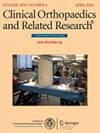Genetic Variants Related to TGF-β Signaling Pathway Modulate Risk of Meniscus Injury: A Multiancestry Genome-wide Association Study.
IF 4.4
2区 医学
Q1 ORTHOPEDICS
引用次数: 0
Abstract
BACKGROUND Numerous clinical risk factors and moderate heritability have been reported for meniscus injury. However, the genetic etiology of meniscus injury remains understudied. This study was a multiancestry genome-wide association study (GWAS) of meniscus injury aimed at identifying genomic variants that influence risk and elucidating the mechanisms by which they may exert their effects. QUESTIONS/PURPOSES (1) Which single nucleotide polymorphisms (SNPs), genes, and molecular pathways are associated with meniscus injury? (2) How do independent SNPs with genome-wide significance alter the expression of genes within cells related to the meniscus? (3) Can a polygenic risk score (PRS) for meniscus injury discriminate between patients with meniscus injury and controls? (4) Does obesity increase the risk of meniscus injury using a Mendelian randomization framework? METHODS A meta-analysis of 38,062 patients with meniscus injury and 700,343 control participants was performed using GWAS summary statistics from the NIH's All of Us and FinnGen cohorts. All of Us provided an ancestrally diverse cohort for a multiancestry GWAS. Functional Mapping and Annotation of Genetic Variants (FUMA) and Meta-Analysis Gene-Set Mining of GWAS (MAGMA) platforms were used to identify genes of interest and perform expression quantitative trait loci and chromatin interaction mapping of SNPs with genome-wide significance. A PRS was developed for European individuals using the FinnGen GWAS and was validated on a European cohort from All of Us. Mendelian randomization assesses putative causal associations between an exposure and outcomes given random assortment of alleles during meiotic recombination and was used to analyze the risk of obesity and meniscus injury. RESULTS Twelve independent genome-wide significant loci (p < 5 × 10-8) were identified, and genes UQCC1, BMP6, EGR2, CAPZB, SMG6 were associated with meniscus injury after Bonferroni correction for all identified genes (p < 2.6 × 10-6). A subset of genes identified through MAGMA were enriched in the transforming growth factor-β (TGF-β) signaling pathway. Independent SNPs altered expression of genes related to the TGF-β pathway, including GDF5, BMP6, MMP24, and UQCC1. As an independent intronic SNP of UQCC1, rs2425055 was in chromosomal contact with GDF5OS in mesenchymal stem cells and decreased the expression of GDF5OS. A PRS for meniscus injury demonstrated differences in genetic risk between patients with meniscus injury and control participants (area under the curve 0.53 [95% confidence interval (CI) 0.51 to 0.54], OR per SD increase 1.10 [95% CI 1.05 to 1.15]; p = 3.34 × 10-5). Mendelian randomization demonstrated that genetic predisposition to obesity increased the risk of meniscus injury (OR 1.29 [95% CI 1.24 to 1.34]; p = 9.58 × 10-38). CONCLUSION The 12 independent genetic variants identified suggest a genetic contribution to meniscus injury risk across multiple ancestries. These SNPs may modulate meniscus injury risk by modifying genetic expression of key upstream regulators of the TGF-β signaling pathway (GDF5,BMP6,TGF-β2) and related genes (UQCC1,EGR2,MMP24). Although previous studies have implicated BMP6 and EGR2 in meniscus fibrochondrocyte differentiation and adaptive stress responses, our results demonstrate that genetic variation related to these genes modifies meniscus injury risk at a population level. In addition to demonstrating a putative causal relationship between obesity and meniscus injury through Mendelian randomization, we present a validated PRS that predicted risk of meniscal injury. CLINICAL RELEVANCE The genes related to meniscus injury identified in this GWAS are promising therapeutic targets for studies on meniscus regeneration. Our validated PRS presents an opportunity to develop screening and prevention strategies for individuals at high risk of meniscus injury.与TGF-β信号通路相关的遗传变异调节半月板损伤风险:一项多祖先全基因组关联研究
背景:半月板损伤有许多临床危险因素和中等遗传力的报道。然而,半月板损伤的遗传病因仍未得到充分研究。本研究是一项半月板损伤的多祖先全基因组关联研究(GWAS),旨在确定影响风险的基因组变异,并阐明它们可能发挥作用的机制。(1)哪些单核苷酸多态性(snp)、基因和分子途径与半月板损伤相关?(2)具有全基因组意义的独立snp如何改变半月板细胞内相关基因的表达?(3)半月板损伤的多基因风险评分(PRS)能否区分半月板损伤患者和对照组?(4)在孟德尔随机化框架下,肥胖是否会增加半月板损伤的风险?方法采用来自NIH All of Us和FinnGen队列的GWAS汇总统计数据,对38,062例半月板损伤患者和700,343名对照受试者进行meta分析。我们所有人都为多祖先GWAS提供了一个祖先多样化的队列。利用遗传变异的功能定位和注释(fua)和GWAS (MAGMA)平台的荟萃分析基因集挖掘(Meta-Analysis Gene-Set Mining)来鉴定感兴趣的基因,并对具有全基因组意义的snp进行表达数量性状位点和染色质相互作用定位。我们为使用FinnGen GWAS的欧洲个体开发了一个PRS,并在All of Us的欧洲队列中进行了验证。孟德尔随机化评估减数分裂重组过程中暴露与随机等位基因分类结果之间的假定因果关系,并用于分析肥胖和半月板损伤的风险。结果共鉴定出12个独立的全基因组显著位点(p < 5 × 10-8),经Bonferroni校正后,所有鉴定的基因UQCC1、BMP6、EGR2、CAPZB、SMG6与半月板损伤相关(p < 2.6 × 10-6)。通过MAGMA鉴定的基因子集在转化生长因子-β (TGF-β)信号通路中富集。独立snp改变TGF-β通路相关基因的表达,包括GDF5、BMP6、MMP24和UQCC1。rs2425055作为UQCC1的独立内含子SNP,在间充质干细胞中与GDF5OS染色体接触,降低GDF5OS的表达。半月板损伤的PRS显示,半月板损伤患者和对照组的遗传风险存在差异(曲线下面积0.53[95%可信区间(CI) 0.51至0.54],OR / SD增加1.10 [95% CI 1.05至1.15];P = 3.34 × 10-5)。孟德尔随机化显示,肥胖的遗传易感增加了半月板损伤的风险(OR 1.29 [95% CI 1.24 ~ 1.34]; p = 9.58 × 10-38)。结论发现的12个独立的遗传变异表明,遗传对半月板损伤风险的影响跨越了多个祖先。这些snp可能通过改变TGF-β信号通路上游关键调控因子(GDF5、BMP6、TGF-β2)和相关基因(UQCC1、EGR2、MMP24)的遗传表达来调节半月板损伤风险。虽然之前的研究表明BMP6和EGR2与半月板纤维软骨细胞分化和适应性应激反应有关,但我们的研究结果表明,与这些基因相关的遗传变异在群体水平上改变了半月板损伤的风险。除了通过孟德尔随机化证明肥胖和半月板损伤之间假定的因果关系外,我们还提出了一个经过验证的预测半月板损伤风险的PRS。该GWAS中发现的与半月板损伤相关的基因是研究半月板再生的有希望的治疗靶点。我们经过验证的PRS为半月板损伤高风险个体提供了筛查和预防策略的机会。
本文章由计算机程序翻译,如有差异,请以英文原文为准。
求助全文
约1分钟内获得全文
求助全文
来源期刊
CiteScore
7.00
自引率
11.90%
发文量
722
审稿时长
2.5 months
期刊介绍:
Clinical Orthopaedics and Related Research® is a leading peer-reviewed journal devoted to the dissemination of new and important orthopaedic knowledge.
CORR® brings readers the latest clinical and basic research, along with columns, commentaries, and interviews with authors.

 求助内容:
求助内容: 应助结果提醒方式:
应助结果提醒方式:


